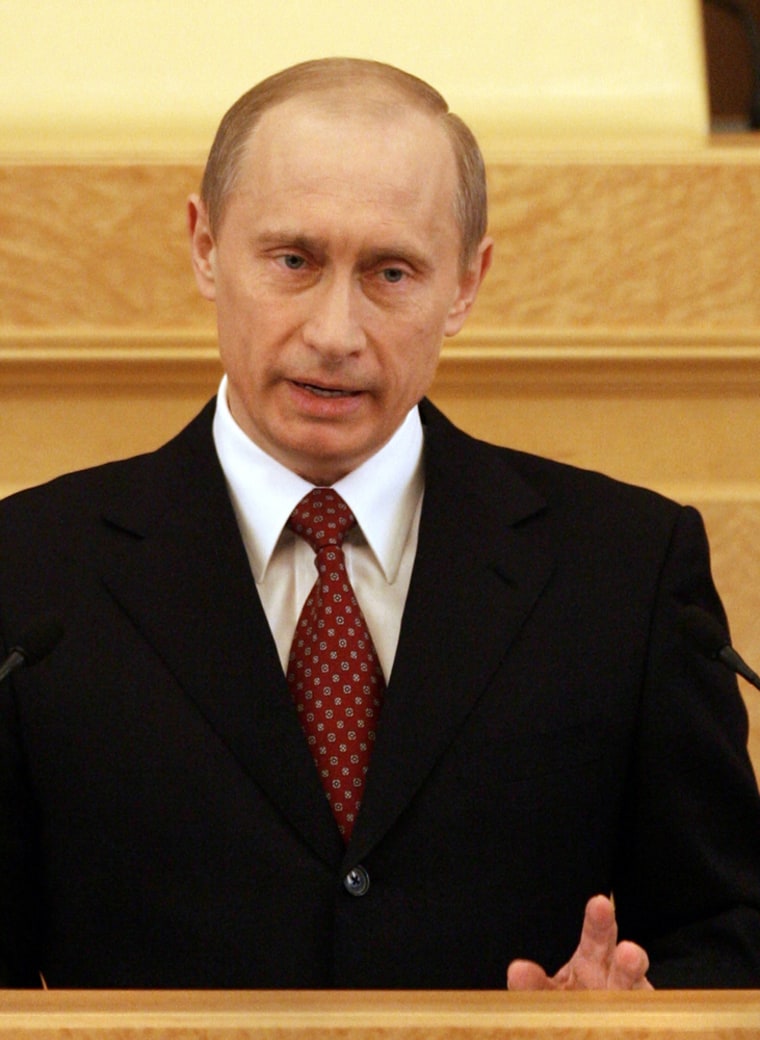Russians have a penchant for a good military parade, and Monday's show of might on the 60th anniversary of the Soviet victory over Nazi Germany, was Vladimir Putin’s day to show off for President Bush and a host of foreign dignitaries.
Putin, Bush and dozens of other leaders watched thousands of soldiers parade across Red Square — fanfare once reserved for Communist Party bosses.
But away from the public ceremonies, in one-on-one talks, Bush has encountered a Russian leader with more on his mind than a military jubilee.
A lot has changed since their first meeting in 2001, when Bush said he gazed into Putin’s soul and proclaimed his counterpart, a former KGB officer, “very straightforward and trustworthy.”
In his five years in office, Putin has abolished most direct elections, muzzled the media and filled his staff with KGB cronies. The country’s biggest oil producer was effectively nationalized at the hands of tax police and courts taking their cues from the Kremlin.
Putin’s backslide on democracy has drawn widespread international criticism, including rebukes from the Bush administration. The Russian leader has shrugged off disapproval from abroad, but he can’t afford to ignore the impact at home.
Bigger bureaucracy
With three years until the end of his second and final term, Putin’s policies, which he defends as vital to preventing the disintegration of the state, are taking their toll.
By concentrating so much power in the Kremlin, U.S. and Russian officials say Putin has made a potentially fatal mistake. Hard-liners who control access to the president are feeding him a limited diet of analysis, thus isolating him from the growing problems of his presidency.
The officials, who spoke on condition of anonymity, stressed that Putin is aware of the problems. In an April 25 national address, he singled out corruption, overzealous tax authorities and, to the surprise of many, a lack of an independent media as impediments to Russia’s economic and social progress.
But the president’s ability to recognize the need for change and effect it is slowed by a bureaucracy of his own making, much of it cut from the cloth of the KGB.
Charles Ryan, a leading American investment banker, says he frequently finds himself chasing after “Kremlin permission slips” to get deals done with Putin’s “unwieldy and, quite frankly, unprofessional bureaucracy.”
The president’s annual address was once watched closely by investors and bureaucrats alike, looking for direction from the Kremlin. But this year businessmen said they had heard it all before. Putin’s words, which should have buoyed wary investors, barely caused a blip on trading screens.
And by all accounts, bureaucrats — which Ryan notes have doubled to 1.2 million during Putin’s five-year-rule — tune out when Putin talks about corruption.
“The point is you could hardly find a bureaucrat in the government which doesn't have business of his own,” said Alexander Lebedev, a billionaire businessman and politician. “It’s very nice to hear about fighting corruption, but nobody’s doing it.”
Politics of oil
Putin, credited with bringing stability and increased living standards after the economic chaos of the 1990s, has seen his once unassailable ratings slip.
His popularity is vulnerable to the price of oil, the engine of the Russian economy. And the ever-increasing wealth of Russia’s elite, many of them state employees, has created a yawning gap between the rich and poor that has led to social instability in other countries.
By pushing through legislation that bypasses direct elections, giving the president the power to appoint governors and pro-Kremlin parties pick their own parliament deputies, Putin has made officialdom much less accountable to — and cut off from — the people it's supposed to serve.
“Power does not equal the state,” said Dmitri Trenin, a political analyst at the Carnegie Moscow Center. “You can have all the power in the world in your hands, and yet you will not have a functioning state. That's the problem in Russia.”
A cynical leader
Individuals who have met with Putin recently or observed his demeanor in meetings with others describe an increasingly cynical leader.
While the precise reason for the shift isn’t clear, Russia has suffered a string of embarrassing policy defeats that undermine Putin’s goal, pounded home on state-controlled TV, of reestablishing the country’s greatness.
A ham-fisted effort to fix elections in neighboring Ukraine backfired when hundreds of thousands of demonstrators demanded a new vote in the former Soviet republic, turning out the Kremlin-backed candidate.
A row over the withdrawal of Russian troops from two bases in Georgia, another former republic, has been the subject of a vicious information campaign on Russian TV, which Putin has put under Kremlin control. Months of talks have failed to find agreement, and Salome Zurabishvili, the Georgian foreign minister, said in an interview that in negotiations the Kremlin has shown itself wary of giving “the impression that there is another withdrawal, another failure by Russia.”
Keeping a hold on power
The Kremlin appears to be preparing for exactly that.
To counter the youth movements that toppled Kremlin-friendly autocrats in Ukraine and Georgia in the last two years, the president’s aides have started their own, presumably more loyal youth party, called “Nashi,” or Ours.
And with nary a Putin successor to take the reins when the president steps down in 2008, Kremlin aides have floated trial balloons suggesting the constitution could be amended to allow a third term.
Analysts and officials say all this may be just the sort of instability the Kremlin wants — an excuse to extend Putin's rule through a real or engineered crisis.
